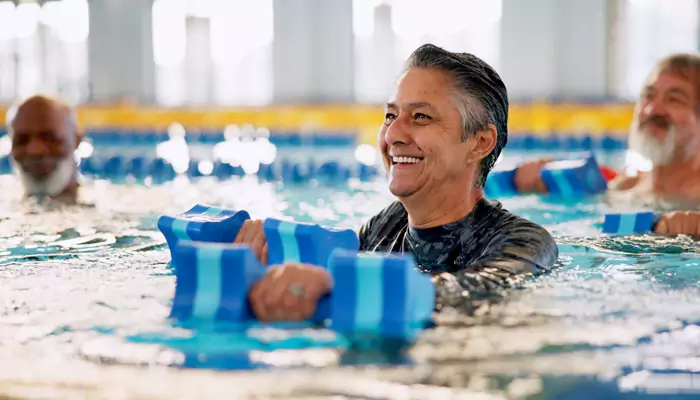Does swimming in a natural water body give more health benefits than a man-made pool? Here is what experts have to say
Experts weigh in on whether swimming in natural water bodies offers more health benefits than man-made pools.
- Rinks
- 08 December, 2024
- 2 mins ago

Does swimming in a natural water body give more health benefits than a man-made pool? Here is what experts have to say
Experts weigh in on whether swimming in natural water bodies offers more health benefits than man-made pools.
Swimming is a popular activity for both fitness and recreation, but the choice between swimming in natural water bodies and man-made pools can influence the benefits you reap. While both offer significant health advantages, experts suggest there are distinct differences in the experiences and potential health benefits of each. Here’s what the experts have to say.
The benefits of swimming in natural water bodies
Natural water bodies such as lakes, rivers, and oceans provide a unique swimming experience that man-made pools cannot fully replicate. The environmental elements and the dynamic nature of natural waters contribute to a range of health benefits.
Exposure to natural elements
Swimming in natural water bodies often means exposure to a variety of natural elements such as minerals, microorganisms, and varying temperatures. For instance, seawater contains beneficial minerals like magnesium, potassium, and iodine, which can be absorbed through the skin and can promote skin health, reduce inflammation, and enhance wound healing.

Mental health and well-being
Being in nature has been shown to reduce stress and improve mental well-being. The tranquillity and beauty of natural water bodies can have a calming effect, which helps in lowering cortisol levels and promoting relaxation. The sights and sounds of nature, such as the crashing waves or rustling trees, provide a soothing backdrop that can enhance the overall swimming experience.
Enhanced physical workout
Natural water bodies offer a more dynamic environment compared to the controlled conditions of a pool. The currents, waves, and varying depths can provide a more strenuous and engaging workout, activating different muscle groups and improving overall strength and endurance. Swimming against a current can increase cardiovascular fitness and build muscle more effectively.
The benefits of swimming in man-made pools
Man-made pools offer their own set of advantages that make them a preferred choice for many swimmers. The controlled environment and safety features provide a reliable setting for consistent exercise.
Controlled environment
One of the biggest advantages of swimming in a man-made pool is the controlled environment. The water is filtered and treated to maintain hygiene and reduce the risk of waterborne illnesses. The temperature is also regulated, making it comfortable to swim year-round, regardless of the weather outside.
Safety and accessibility
Man-made pools are designed with safety in mind. Lifeguards are often present, and the environment is free from natural hazards such as sharp rocks, strong currents, or marine life. This makes pools particularly suitable for beginners. Additionally, accessibility features like ramps and lifts make pools more inclusive for people with disabilities.
Structured workouts
For those looking to follow a structured exercise regimen, pools offer the perfect environment. Lanes marked for lap swimming, consistent water conditions, and availability of training aids like kickboards and swim fins make it easier to follow a specific workout plan. Pools also host various swim classes, including water aerobics and swimming lessons, providing opportunities for skill improvement and social interaction.
While swimming in natural water bodies can offer unique benefits such as exposure to natural minerals and a more engaging physical workout, man-made pools provide a safe, controlled environment that is accessible year-round. Ultimately, the choice between the two depends on individual preferences, goals, and circumstances. Both settings provide excellent opportunities for improving physical fitness, mental health, and overall well-being. Whether you prefer the open waters of a lake or the predictability of a pool, swimming remains one of the best exercises for a healthy lifestyle.








